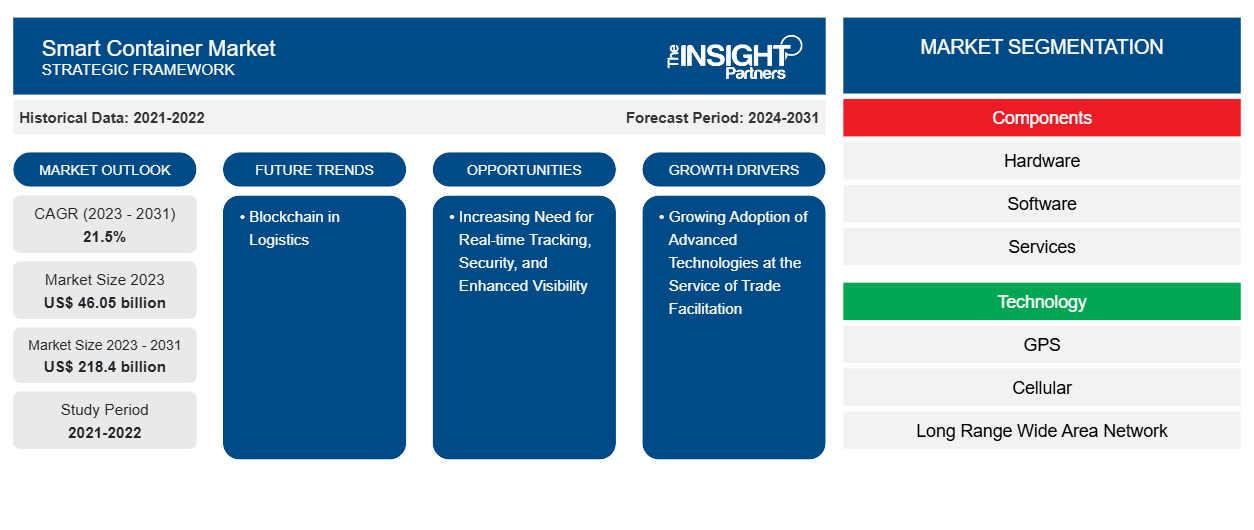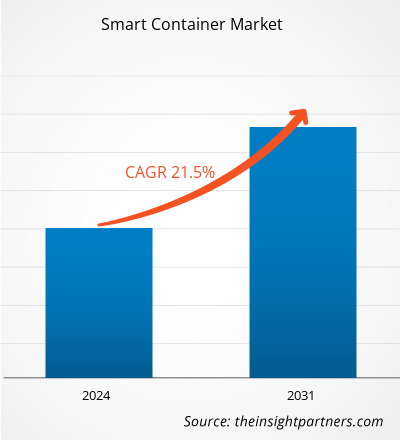Smart Container Market Dynamics and Trends by 2031
Smart Container Market Size and Forecast (2021 - 2031), Global and Regional Share, Trend, and Growth Opportunity Analysis Report Coverage: By Components (Hardware, Software, Services); Technology (GPS, Cellular, Long Range Wide Area Network, Bluetooth Low Energy (BLE), Others); Industry Vertical (Food & Beverages, Pharmaceutical, Oil & Gas, Chemicals, Others), and Geography
Historic Data: 2021-2022 | Base Year: 2023 | Forecast Period: 2024-2031- Report Date : Mar 2026
- Report Code : TIPRE00007637
- Category : Electronics and Semiconductor
- Status : Data Released
- Available Report Formats :


- No. of Pages : 150
The smart container market size is projected to reach US$ 218.4 billion by 2031 from US$ 46.05 billion in 2023. The market is expected to register a CAGR of 21.5% in 2023–2031. The market is growing due to the increasing demand for shipping and real time tracking of the goods.
Smart Container Market Analysis
Smart container technology can be linked to other innovations, such as big data, blockchain, or data pipelines, to provide even more support to the trading community. In all of these cases, though, we see that creating clear, explicit message exchange standards will allow us to capitalize on the full potential of the enhanced data.
Smart Container Market Overview
Smart containers mean shipping lines and cargo-related stakeholders can have access to container data coming from the source regardless of whether the container is on a ship, in a yard, or at any other point during its pre-haul and post-haul journey. Smart Containers are embracing the Internet of Things (IoT) to enhance decision-making by the various sectoral stakeholders.This provides superior visibility to the investors within the transaction as well as to regulatory agencies who need comprehensive information on the consignments before they arrive at the border.
Customize This Report To Suit Your Requirement
Get FREE CUSTOMIZATIONSmart Container Market: Strategic Insights

-
Get Top Key Market Trends of this report.This FREE sample will include data analysis, ranging from market trends to estimates and forecasts.
Smart Container Market Drivers and Opportunities
Growing Adoption of Advanced Technologies at the Service of Trade Facilitation to Favor Market
Different technologies enable Smart containers to communicate information captured through a wide range of sensors about their current status (e.g., GPS position, door opening detection, movements vibrations and shocks, atmospheric conditions, etc.) and to remotely change their parameter settings (e.g., temperature setups, remote defrost, etc.) anywhere, anytime. IoT technologies have proven there is huge potential for businesses to leverage their efficiency and mitigate their risks. Smart assets will become a common feature in the shipping industry.Smart containers transmit a large amount of data, which, combined with other data in the primary host system, can be analyzed and interpreted to provide even more relevant evaluations. This data is not only useful during the journey of a single container. In the context of multiple trips over an extended time, it can provide global visibility of operations. When comparing average turnaround times or damage rates between different ports and yards, one can build and evaluate programs to bring all stakeholders up to the same level of supply chain excellence. Thus, the growing adoption of advanced technologies at the service of trade facilitation is driving the growth of the smart containers market.
Increasing Need for Real-time Tracking, Security, and Enhanced Visibility.
One of the most valuable advantages of smart containers is the ability to record shipments in real-time. The persistent flow of data from these containers allows logistics providers and customers to know the accurate status and location of their shipments at any given moment. This feature not only improves delivery accuracy and reduces the chances of lost shipments but also allows for proactive issue resolution, thus significantly enhancing customer service. Smart containers are also revolutionizing logistics security through technologies such as geofencing, which can generate alerts if containers stray from their predefined path or if unauthorized access is detected. This level of security is remarkably important in the transportation of high-value or sensitive goods and plays a critical role in deterring theft and improving overall supply chain security.
Smart Container Market Report Segmentation Analysis
Key segments that contributed to the derivation of the smart container market analysis are component, technology, and industry vertical.
- Based on components, the smart container market is segmented into hardware, software, and services.
- Based on technology, the smart container market is segmented into GPS, cellular, long range wide area network, Bluetooth low energy (BLE), and others.
- Based on the industry vertical, the smart container market is segmented into food & beverages, pharmaceuticals, oil & gas, chemicals, and others.
Smart Container Market Share Analysis by Geography
The geographic scope of the smart container market report is mainly divided into five regions: North America, Asia Pacific, Europe, Middle East & Africa, and South America/South & Central America. Smart containers are changing the customer experience in logistics. Real-time tracing and enhanced visibility mean customers are always notified about the status of their shipments, reducing uncertainty and improving trust, which is propelling the growth of the smart containers market.
Smart Container Market Regional InsightsThe regional trends and factors influencing the Smart Container Market throughout the forecast period have been thoroughly explained by the analysts at The Insight Partners. This section also discusses Smart Container Market segments and geography across North America, Europe, Asia Pacific, Middle East and Africa, and South and Central America.
Smart Container Market Report Scope
| Report Attribute | Details |
|---|---|
| Market size in 2023 | US$ 46.05 billion |
| Market Size by 2031 | US$ 218.4 billion |
| Global CAGR (2023 - 2031) | 21.5% |
| Historical Data | 2021-2022 |
| Forecast period | 2024-2031 |
| Segments Covered |
By Components
|
| Regions and Countries Covered |
North America
|
| Market leaders and key company profiles |
|
Smart Container Market Players Density: Understanding Its Impact on Business Dynamics
The Smart Container Market is growing rapidly, driven by increasing end-user demand due to factors such as evolving consumer preferences, technological advancements, and greater awareness of the product's benefits. As demand rises, businesses are expanding their offerings, innovating to meet consumer needs, and capitalizing on emerging trends, which further fuels market growth.

- Get the Smart Container Market top key players overview
Smart Container Market News and Recent Developments
The smart container market is evaluated by gathering qualitative and quantitative data post primary and secondary research, which includes important corporate publications, association data, and databases. The following is a list of developments in the market:
- In February 2022, French carrier CMA CGM launched SMART containers equipped with state-of-the-art Emerson technology, which allows users to monitor the status and conditions of the container in real time. Receive key data such as location, temperature, and gas variations.
(Source: CMA CGM, Company Website, 2022)
- In October 2023, Tower Cold Chain announced a series of new initiatives for KTEvolution, its ‘small box’ solution for direct-to-patient, sample shipment, and last-mile deliveries. Amongst the new offering is a ‘click & collect’ service for airlines, pharmaceutical companies, and 3PLs who rent the containers as well as the option to purchase – and customize.
(Source: Tower Cold Chain, Company Website, 2022)
Smart Container Market Report Coverage and Deliverables
The "Smart Container Market Size and Forecast (2021–2031)" report provides a detailed analysis of the market covering below areas:
- Market size and forecast at global, regional, and country levels for all the key market segments covered under the scope
- Market dynamics such as drivers, restraints, and key opportunities
- Key future trends
- Detailed PEST/Porter's Five Forces and SWOT analysis
- Global and regional market analysis covering key market trends, major players, regulations, and recent market developments
- Industry landscape and competition analysis covering market concentration, heat map analysis, prominent players, and recent developments
- Detailed company profiles
Frequently Asked Questions
Naveen is an experienced market research and consulting professional with over 9 years of expertise across custom, syndicated, and consulting projects. Currently serving as Associate Vice President, he has successfully managed stakeholders across the project value chain and has authored over 100 research reports and 30+ consulting assignments. His work spans across industrial and government projects, contributing significantly to client success and data-driven decision-making.
Naveen holds an Engineering degree in Electronics & Communication from VTU, Karnataka, and an MBA in Marketing & Operations from Manipal University. He has been an active IEEE member for 9 years, participating in conferences, technical symposiums, and volunteering at both section and regional levels. Prior to his current role, he worked as an Associate Strategic Consultant at IndustryARC and as an Industrial Server Consultant at Hewlett Packard (HP Global).
- Historical Analysis (2 Years), Base Year, Forecast (7 Years) with CAGR
- PEST and SWOT Analysis
- Market Size Value / Volume - Global, Regional, Country
- Industry and Competitive Landscape
- Excel Dataset
Recent Reports
Testimonials
The Insight Partners' SCADA System Market report is comprehensive, with valuable insights on current trends and future forecasts. The team was highly professional, responsive, and supportive throughout. We are very satisfied and highly recommend their services.
RAN KEDEM Partner, Reali Technologies LTDsI requested a report on a very specific software market and the team produced the report in a few days. The information was very relevant and well presented. I then requested some changes and additions to the report. The team was again very responsive and I got the final report in less than a week.
JEAN-HERVE JENN Chairman, Future AnalyticaWe worked with The Insight Partners for an important market study and forecast. They gave us clear insights into opportunities and risks, which helped shape our plans. Their research was easy to use and based on solid data. It helped us make smart, confident decisions. We highly recommend them.
PIYUSH NAGPAL Sr. Vice President, High Beam GlobalThe Insight Partners delivered insightful, well-structured market research with strong domain expertise. Their team was professional and responsive throughout. The user-friendly website made accessing industry reports seamless. We highly recommend them for reliable, high-quality research services
YUKIHIKO ADACHI CEO, Deep Blue, LLC.This is the first time I have purchased a market report from The Insight Partners.While I was unsure at first, I visited their web site and felt more comfortable to take the risk and purchase a market report.I am completely satisfied with the quality of the report and customer service. I had several questions and comments with the initial report, but after a couple of dialogs over email with their analyst I believe I have a report that I can use as input to our strategic planning process.Thank you so much for taking the extra time and making this a positive experience.I will definitely recommend your service to others and you will be my first call when we need further market data.
JOHN SUZUKI President and Chief Executive Officer, Board Director, BK TechnologiesI wish to appreciate your support and the professionalism you displayed in the course of attending to my request for information regarding to infectious disease IVD market in Nigeria. I appreciate your patience, your guidance, and the fact that you were willing to offer a discount, which eventually made it possible for us to close a deal. I look forward to engaging The Insight Partners in the future, all thanks to the impression you have created in me as a result of this first encounter.
DR CHIJIOKE ONYIA MANAGING DIRECTOR, PineCrest Healthcare Ltd.Reason to Buy
- Informed Decision-Making
- Understanding Market Dynamics
- Competitive Analysis
- Identifying Emerging Markets
- Customer Insights
- Market Forecasts
- Risk Mitigation
- Boosting Operational Efficiency
- Strategic Planning
- Investment Justification
- Tracking Industry Innovations
- Aligning with Regulatory Trends




















 Get Free Sample For
Get Free Sample For